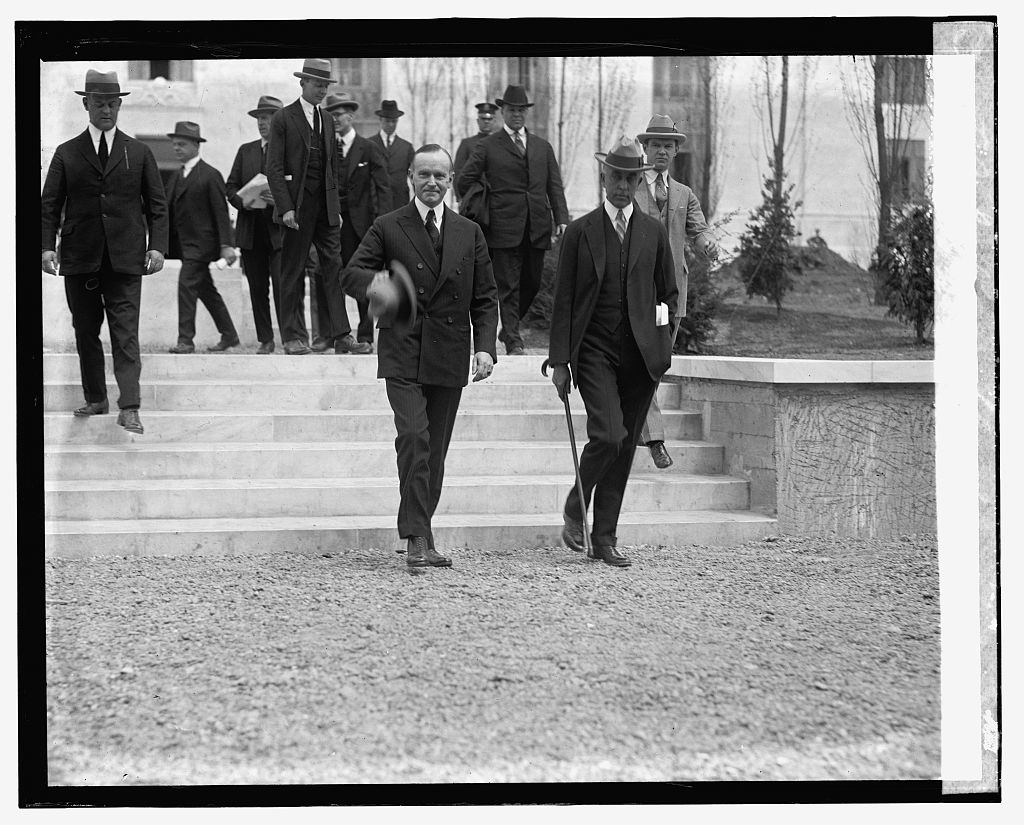“It would not be just to conclude that President Coolidge is obstinate or opinionated because of this exhibition of consistency as to principles and policies of government. These are fundamentals. He has no egotistical belief that he can immediately solve a perplexing national problem, without study and without reflection. The public is protected from hasty action later to be regretted, yet when the Senate demanded the resignation of a member of his Cabinet and an immediate answer was necessary, it came like a flash of lightning. He knows, however, that by intense mental application there is every probability that he can always secure the right solution to any problem. He begins an important inquiry with all the zest of his spirit. He takes counsel. He seeks advice. His methods are those of a trained research worker. He sends for wise and informed men, and for books and document–but especially for men. He loves to listen.
“Patiently and thoroughly he continues this process until he gets the principal facts and the various points of view pertaining to his subject. The President then weighs the evidence in his own mind and reaches his conclusion. He acts from logic rather than from inspiration. He concentrates more intensely and more continuously than any man I have ever known. Morning, noon, and night he keeps thinking, thinking. He indulges in no distracting pleasures. He has no recreation, even, beyond daily walks and occasional week-end trips on the Mayflower. All his working hours, except those involved in the inescapable routine of his office, are devoted to intense, concentrated mental labour upon his duties and problems. It is not surprising that in the expression of his thoughts he has won the admiration of mankind, for he is a student of history, trained in the science of logical analysis, and disciplined to work steadfastly and hard. Most important of all, his mind is fortified by his character. He is honest–morally honest and intellectually honest. He wants to reach the right conclusion, not only because it is an intellectual pleasure to have the right answer, but because he simply cannot tolerate anything wrong in himself. His decisions are guided by conscience as well as by knowledge, reason, and proper political consideration.
“The Presidency is a test of character as well as a test of wisdom. In reading this book the reader will miss half of its significance if he does not weigh the President’s words for what they tell of his character as well as for what they tell of his mind…
“In dealing with public or political questions President Coolidge has political intuition almost psychic. One cannot see, tough, or hear a political tide, but it can be felt. The man in public life who fails to create a tide or sense an adverse tide will soon be politically lost. Coolidge, with the single exception of [Theodore] Roosevelt, has possessed this intuition in the most marked degree of all our recent Presidents–Taft, perhaps, the least. Wilson developed it; Harrison was cold intellect; Cleveland, rugged force. Neither had this psychic sense. All were great Presidents. No one in his lifetime, of course, should be compared with Lincoln, preserved for all the ages in the shroud of immortality, but I think of President Coolidge as like Lincoln in this respect” — C. Bascom Slemp, “An Analysis and an Interpretation” to The Mind of the President, 1926.
